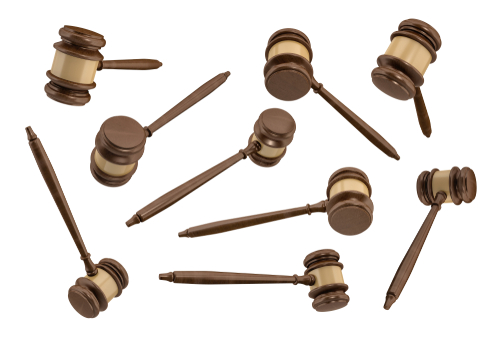Doc Defender: He's the Fair-Use Guru of Nonfiction Movies

Photo of Michael Donaldson by Sal Owen
Documentary filmmakers use thousands of images, trademarks and other intellectual property in their creations, often targeting for criticism the people or corporations that are the lawful owners of the material being used. So when threatening letters arrive at filmmakers’ offices, they often send an SOS to Los Angeles attorney Michael Donaldson, the “legal Obi Wan Kenobi” and fair-use guru of the documentary film set.
Donaldson, a partner in the firm of Donaldson and Callif, has been representing independent filmmakers for more than 30 years. He’s the general counsel to Film Independent (home of the Independent Spirit Awards and the Los Angeles Film Festival) and the Writers Guild Foundation. He co-authored The American Bar Association Legal Guide to Independent Filmmaking with partner Lisa Callif. He can also say he wrote the book on fair use. Clearance and Copyright: Everything You Need To Know for Film and Television is in its third edition, praised by Geoffrey Gilmore, director of the Sundance Festival, as the “one place to go for all the answers.”
Despite the accolades, Donaldson comes across more as a documentary fan than a Hollywood power player.
“I’ve always had a passion for independent film, and documentary film in particular, and my practice is a matter of following that passion,” he says. “Lawyers who are unhappy with their practices might have gotten involved with things they weren’t very passionate about.”
Donaldson’s calling was an evolution.
“I started out as a litigator and decided fairly early on it wasn’t something I wanted to do forever,” he says. A large, now defunct New York City firm rented more offices than it needed, and he traded his time for working on entertainment cases, transitioning from litigation to a more general entertainment-transactions practice representing independent filmmakers, writers, directors and producers.
In representing documentary film makers, Donaldson goes up against copyright holders who don’t even want the docs made, let alone allowing use of footage they own.
“We operate as educators as much as anything else,” he says. “We evaluate the film, and it’s frequently a matter of educating the lawyer on the other side as to what the law is. Most lawyers think they know fair use, but we handle the claims and they all go away. Occasionally we settle one for less than the standard licensing fee.”
3-PART DEFENSE
Donaldson says there are three elements to a successful fair-use defense for nonfiction films, including that the material is a “very good illustration of the point the film is making, that they only used what they needed to make the point, and the connection [between the material used and the point the film is making] is clear.”
“When the claim comes in,” says Donaldson, “we don’t say, ‘We’re right and you’re wrong—see you in court.’ We say, ‘OK I see why you’re upset,’ but then we start talking about where the law is, and then we send them not only a nice long letter, but a DVD showing them the use in another film where the use was legally sound and that had been litigated so they can see them side by side.
“These uses repeat themselves, and that’s why these claims go away, because we’ve amassed a great library of items that are or have been the subject of litigation.”
And sometimes Donaldson ends up doing some fair-use editing for his clients. “We go back to the filmmaker and say, ‘I get why you’re using this, but after it illustrated the point you left it running because there was a wonderful punch line. You’ve got to take the punch line out; that’s not fair.’ ”
Among his client’s films are Miss Representation , about how the media misrepresents women, nominated for a 2011 Sundance Film Festival Award; and Oscar-nominated Gasland, about the environmental impact of “fracking,” a procedure of creating fractures in rocks and rock formations used in drilling for natural gas.
Inside Job, a Donaldson-rep resented film about the Lehman Brothers collapse of 2008, won an Academy Award in 2011.
Donaldson declined to speculate on which of his clients might be nominated for a 2012 Oscar: “I could tick off a lot of clients.”
His title of “legal Obi Wan Kenobi” was bestowed by Eddie Schmidt, president of the International Documentary Association. Schmidt produced This Film Is Not Yet Rated, about how film rating boards handle sexual material and influence culture. The film had 134 clips that were covered by fair use.
“Michael did a remarkable job on This Film Is Not Yet Rated. He made the film possible,” says Schmidt. “By following his guidance, we were able to make a much more persuasive, penetrating case about how ratings boards have a tremendous effect in what we do or don’t see.”
Schmidt says Donaldson is “very animated and excited when he seizes upon an idea, but also very thoughtful and shrewd in understanding the complexities, politics and perceptions of situations. He has taken on many pro bono cases on behalf of our organization.”
Outside the office, Donaldson has a domestic partner of 12 years, three daughters and three grandchildren.
Among his hobbies—Donaldson won a gold medal at the 1998 Senior Olympics for parallel bars and a silver on rings—is globe walking.
“I was online one night and I was curious about how people walk on those big balls—2½ feet high—at the circus,” he explains. “So I ordered it from the circus supply store. My Pilates instructor didn’t know anything about how to do it, so I taught myself. … Now I can walk around the park, go downhill, uphill. It’s amazing —and a lot harder than it looks!”



